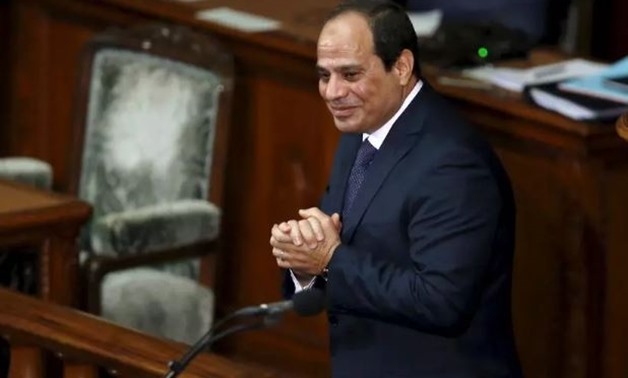
FILE - President Abdel Fatah al-Sisi reacts after delivering a speech at the lower house of parliament in Tokyo on February 29, 2016 - Reuters
CAIRO – 17 December 2018: President Abdel Fatah al-Sisi's first visit to Austria from December 16 to 20 highlights the distinct Egyptian-Austrian relations, which have been strengthened in the past years on different levels including politics and economics.
President Sisi headed on Dec. 16 to Vienna for a four-day visit to participate in the High-level Forum Africa-Europe, during which he will meet with several Austrian officials and investors and sign a Memorandum of Understanding (MoU).
Sisi's participation in the forum comes upon the invitation of Federal Chancellor of the Republic of Austria Sebastian Kurz who holds the presidency of the council of the European Union and President of the Republic of Rwanda and current Chairperson of the African Union Paul Kagame.
This is Sisi's first visit to Austria and the first presidential visit between Egypt and Austria in more than 11 years, according to Ambassador of Egypt to Austria Omar Amer's statement to the media delegation accompanying the president.
Meanwhile, Presidency Spokesperson Bassam Radi referred that Egypt was invited to the forum due to the significant role the country plays in Africa, especially that it holds the presidency of the upcoming African Union.
Before Sisi came into power, Egyptian-EU relations were hindered as the European side did not fully understand the Egyptian situation after the June 30 uprising that toppled former Muslim Brotherhood-affiliated President Mohamed Morsi.
After a series of tours and meetings with European leaders and decision makers, relations between Egypt and Europe began to stabilize.
The Egyptian Cabinet said in a statement on Oct. 30, 2017 that the government signed agreements with the European Union for around €500 million to fund development projects over the next three years.
Egypt and Austria witness fruitful cooperation on different levels, namely in economy.
Political relations
On the political level, the two countries usually shed light during their mutual talks on the regional issues, including recent developments in Gaza Strip and ways to resume the negotiations to reach a comprehensive solution to the crisis, in addition to the situations in Libya, Iraq and Syria and how to boost cooperation to combat terrorism.
In September 2018, President of the European Council Donald Tusk and Chancellor of Austria Sebastian Kurz paid Egypt a visit.
During their meeting, Sisi underlined efforts exerted by Egypt to combat illegal immigration by securing sea and land ports, in light of the instability in neighboring countries.
Sisi underscored that Egypt's efforts have contributed to addressing the illegal immigration of refugees across the Mediterranean, as there has not been a single case recorded from Egypt since 2016.
The meeting also tackled a number of other issues, such as the Libyan and Syrian crises, as both sides have similar views concerning these crises, urging the need to reach political settlements for them in order to eliminate the illegal immigration phenomenon.
The two sides agreed on the need to intensify the Arab-European coordination to face regional challenges and threats, underlining that the EU and Arab countries summit serves as an opportunity to consult, exchange views and boost cooperation between both sides on regional issues.
In addition, Foreign Minister Sameh Shoukry met with Kurz in July during Shoukry's European tour.
Their meeting touched on some files, such as illegal immigration and fighting terrorism.
Economic relations.
In a phone call with Austrian Chancellor Kurz on December 11, President Sisi expressed Egypt's keenness to boost relations with Austria, especially through maximizing economic cooperation and increasing the volume of trade exchange between the two countries.
In this regard, President Sisi urged Austrian businessmen and major companies to invest in Egypt, given the recent positive developments that took place due to the economic reforms.
For his part, the Austrian chancellor said that Austria is willing to elevate bilateral ties with Egypt, praising the great progress Cairo has witnessed in the areas of economic and social development, alongside the mega national projects and the efforts exerted to enhance the investment climate.
Additionally, Electricity Minister Mohamed Shaker, leading a high-level delegation, visited Austria from September 17 to 21 to participate in the activities of the 62nd General conference of the International Atomic Energy Agency (IAEA).
During his speech in the conference, Shaker highlighted the growing international cooperation in several fields such as nuclear power, the safe transfer of nuclear wastes, and the ways to enhance IAEA activities related to nuclear science, technologies and applications.
Historically, Egyptian Austrian Businessmen Council was established in November 2006. The council held four sessions alternatively between Egypt and Austria, the last of which was from March 16 to 19, 2009, in Cairo, according to the State Information Service (SIS).
Furthermore, trade between Egypt and Austria has been regulated by the Egyptian-European Association Agreement according to which Egypt and the European Union have been gradually establishing a “Free Trade Zone “ during a transitional period not exceeding 12 years from the date of entry into force, on 1/6/2004.


Comments
Leave a Comment